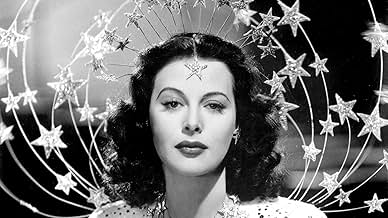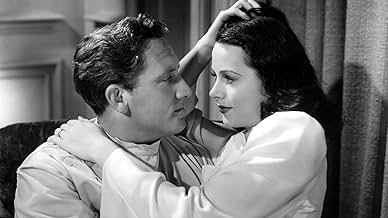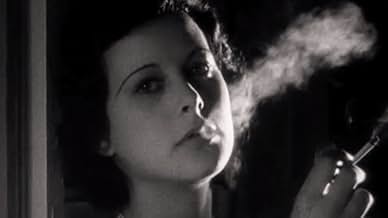Hedy Lamarr: la femme derrière le wi-fi
La vie et la carrière de la star acclamée du cinéma hollywoodien et inventrice de génie sous-estimée, Hedy Lamarr.La vie et la carrière de la star acclamée du cinéma hollywoodien et inventrice de génie sous-estimée, Hedy Lamarr.La vie et la carrière de la star acclamée du cinéma hollywoodien et inventrice de génie sous-estimée, Hedy Lamarr.
- Prix
- 8 victoires et 5 nominations au total
- Self
- (archive footage)
- Self
- (as Manya Breuer)
- Self
- (as Guy P. Livingston)
Histoire
Le saviez-vous
- AnecdotesDiane Kruger appears as an interviewee in this documentary. Although it is not mentioned during the film, Kruger was at the time preparing to produce a TV miniseries biopic on the life of Hedy Lamarr, with Kruger herself starring as Lamarr. The biopic was to be an adaptation of the 2012 biography Hedy's Folly: The Life and Breakthrough Inventions of Hedy Lamarr, The Most Beautiful Woman in the World by Richard Rhodes. All three projects (the Rhodes book, the documentary "Bombshell," and the development of the screenplay for Kruger's miniseries) were awarded grants by the Alfred P. Sloan Foundation, a philanthropic organization that normally supports science and technology experiments and endeavors.
- Citations
[last lines]
Hedy Lamarr - Self: [voice over] I'll read you something pretty. "People are unreasonable, illogical and self-centered - love them anyway. If you do good, people will accuse you of selfish, alternative motives - do good anyway. The biggest people with the biggest ideas can be shot down by the smallest people with the smallest minds - think big anyway. What you spend years building may be destroyed overnight - build anyway. Give the world the best you have and you'll be kicked into the teeth - give the world the best you've got anyway."
- ConnexionsFeatures Ballet mécanique (1924)
- Bandes originalesDr. Feelgood (Love Is a Serious Business)
Performed by Aretha Franklin
Written by Aretha Franklin and Ted White
She helped Howard Hughes design better planes by studying streamlining in birds and fishes. She invented Frequency Hopping (along with composer George Antheil). She founded Aspen as a ski resort. She produced movies (unheard of for a woman at the time). She came up with techniques on cosmetic surgery to hide the scars. Unfortunately she also became a poster child for reasons not to undergo the operation. Her unsuccessful surgeries probably added to her being a recluse.
She wanted to be recognized for her mind and not her beauty. Yet she married a series of men who treated her as a trophy wife. Her most famous contribution to science was in devising a system for secret transmissions (frequency hopping). It's greater value was not realized until the advent of GPS, Bluetooth and WiFi.
She was recognized/honoured for her invention at a Science Forum which she opted not to attend but left a recording played by her son. The film showed her phoning halfway through the presentation to ask how it went. Her son advises that he is in the middle of it and that he loves her.
Frequency hopping has multiple inventors. In 1899 Marconi performed an experiment using the technique. Nikola Tesla received a patent in 1903. German military used frequency hopping in World War One. A Polish inventor, Leonard Danilewicz had the idea in 1929. In 1942 a patent was awarded to Hedy Lamar. In 1980 a Winnipeg filmmaker originated the idea (called Variable Transmission Broadcast) as a plot device to represent Norway in a symbolic re-enactment of World War Two where rival transportation companies, representing Germany and England, sought to steal the idea symbolic of invading Norway (both sides wanted to). The film did not get made but it is ironic that frequency hopping technology of Bluetooth has Scandanavian roots. Ray Zinn gained a patent in 2006 for his version. Slight improvements justify issuing new patents.
Although she had raised $25 million for the War effort her patent was confiscated based on her being a foreign alien (having been born in Austria).
The navy had secretly used her technology some ten years later. She would have been entitled to royalty payments if she had known. She also didn't know that you can only go back six years from the time one launches a lawsuit. It is not enough to have a patent; one has to Police it to see if being infringed; Prosecute (take it to court); Prove it was your idea they stole; and Profit* for the effort By the time she found out her patent had long expired.
The film covers her being exploited as a movie star and inventor and innovator. This late tribute values her contributions and recognizes her pioneering roles.
* back then you could recover costs - today that provision has been taken away. So it is profitable to steal patents and only pay royalties once losing in court (happens may be one time in eight that an inventor sues). See "Flash of Genius".
- futuretype
- 29 nov. 2017
- Lien permanent
Meilleurs choix
- How long is Bombshell: The Hedy Lamarr Story?Propulsé par Alexa
Détails
- Date de sortie
- Pays d’origine
- Site officiel
- Langues
- Aussi connu sous le nom de
- Bombshell: The Hedy Lamarr Story
- Lieux de tournage
- Vienne, Autriche(archive footage)
- société de production
- Consultez plus de crédits d'entreprise sur IMDbPro
Box-office
- Budget
- 1 500 000 $ US (estimation)
- Brut – États-Unis et Canada
- 820 300 $ US
- Fin de semaine d'ouverture – États-Unis et Canada
- 8 000 $ US
- 3 déc. 2017
- Brut – à l'échelle mondiale
- 1 092 941 $ US
- Durée1 heure 28 minutes
- Couleur
- Rapport de forme
- 1.85 : 1
Contribuer à cette page






























